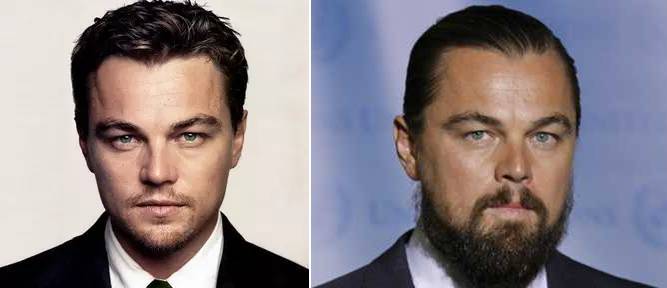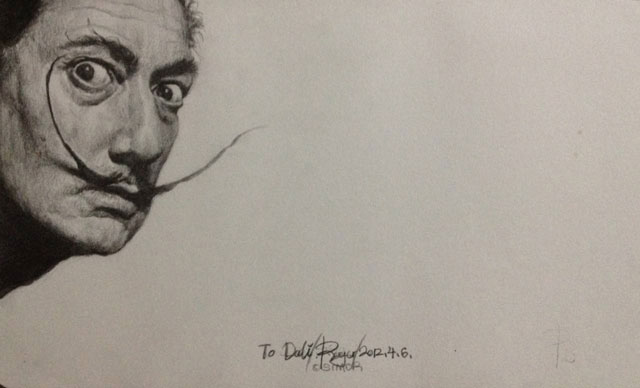Unless you’ve been hiding under a rock, you’ll have noticed that beards have come sprouting back into fashion, at least in the UK and US. To psychologists, this phenomenon raises several inter-related questions, such as – are these men just copying each other; what does a beard do to a man’s attractiveness; does it make him look more macho; and given the answers to the previous, should I grow one too? Well, that last question might apply only to male psychologists. Anyhow, here to help you untangle these issues, we present the latest in our world-famous series of special features: the psychology of beards, digested.
除非你一直躲在岩石下面,否则你会注意到胡子已经重新流行起来了,至少在英国和美国是这样。对心理学家来说,这一现象引发了几个相互关联的问题,例如:这些男人只是互相模仿吗?胡子对男人的吸引力有什么作用?这是否会使他看起来更具男子气概?为了回答前面的问题,我是否也应该留胡子?那么,最后一个问题可能只适用于男性心理学家。总之,来帮助你解决这些问题,在我们的举世闻名的最新特刊中,向大家呈现了研究精华:胡子心理学.
Beards make men look more attractive (except when they don’t)
胡子使男人看起来更有魅力(除非他们不留胡子)
One influential theory is that men’s beards are an adornment, like a peacock’s tail, which make them more attractive, especially to the opposite sex. Yet the research on whether men with beards are more attractive is contradictory.
一个有影响的理论是,男人的胡须是一种装饰物,就像是孔雀的尾巴,使它们更具吸引力,尤其是对于异性。然而,留胡子的男人真的更具吸引力么?对于这个话题的研究是矛盾的。
This paper from 1973 that involved undergrads rating men’s faces found that bearded men were considered better-looking (not to mention more masculine, mature, dominant, self-confident, courageous, liberal, nonconforming, industrious, and older). That was the hairy 70s you say, but this study published this very month in Archives of Sexual Behaviour also found that hundreds of women recruited online consistently rated bearded men, regardless of amount of beard growth, as more sexually attractive than their clean-shaven counterparts.
一项涉及了1973年的大学生对男性的脸的调查研究发现,那时认为,留胡子的男人是更好看的(更不用说更阳刚,成熟,优越性,自信,勇敢,自由,不同流合污,勤劳,以及老迈)。这是你说的70年代的毛发,但这项发表在本月《性行为研究》的研究还发现,数百名网上招聘的女性一致认为有胡子的男人更具吸引力,无论胡须长多长,因为,他们比胡子刮得干干净净的同行更有性吸引力。
But male readers, before you bin your razor, consider that another study from 1991, involving undergrads doing the rating, found that clean-shaven men were seen as “younger, more attractive, and more sociable” than the beardies, while another paper out this year found that “there was no main effect of facial hair growth on ratings of attractiveness”.
但男性读者们,在你扔掉你的剃须刀之前,应该考虑来自于1991年的另一项研究,这项涉及本科生的研究测评发现,胡子刮得很干净的男人比蓄须者“更年轻,更有吸引力,更善于交际”,而另一个今年的研究发现:“面部毛发生长对吸引力的比率没有主要的影响”。
We may have hit peak beard
我们可能已经到了蓄须巅峰的年代
Part of the reason for these mixed findings is likely that when beards are in vogue, as they are today, a man with a beard no longer stands out from the crowd. Researchers tested this idea a couple of years ago by presenting participants with either lots of pictures of bearded men, or lots of pictures of clean-shaven men, or a mix, before then having them rate the attractiveness of a bunch more men, bearded and non-bearded.
这些发现混杂不清的部分原因可能是,就像如今的胡子流行一样,留胡子的人不再鹤立鸡群了。研究人员验证了这个想法,他们在几年前向参与者呈现了许多有胡子的男人的照片,或者是胡子刮得很干净的人的照片,或者兼而有之,然后让他们给一大堆男人的吸引力打分,留胡子的和不留胡子的。
The revealing finding was that bearded men were seen as relatively more attractive after the researchers had created a clean-shaven background context. This supports the idea that beards boost attractiveness when they help make a man distinctive from his peers. The result also complements historical research showing that hair length, side-burns, and beards tend to follow the same cyclical pattern, increasing in popularity and length until they reach a peak and then subsiding again. All of which prompted the researchers to suggest that in current times we may well be close to reaching “peak beard“.
显而易见的发现是,在研究者创造了一个清爽干净的照片背景后,有胡子的男人被认为是较有吸引力的,这就支持了胡子让人与众不同的想法。这一结果也补充了历史研究所说明的:毛发长度、侧面烧伤和胡须的周期性模式倾向趋于同步,它们随着流行的程度也越来越受欢迎,直到达到峰值,然后再次下沉。所有这些都促使研究人员指出,在当前的时代,我们很可能接近了“蓄须的巅峰”。
Bearded men look more macho
有胡子的男人看起来更有男子气概。
A rival evolutionary theory for men’s beards suggests that they aren’t so much about attracting women, but more about frightening other men by helping their owners to look aggressive and dominant. The findings here are more consistent. For example, this cross-cultural study from 2012 found that European women from New Zealand and Polynesian women from Samoa rated bearded men’s faces as older and higher social status (but not more attractive) and they perceived bearded men pulling an aggressive face as more aggressive than clean-shaven men doing the same.
一个关于男性胡须的竞争演化理论表明,它们对女性的吸引力并没有那么多,而是更多地通过帮助她们的主人看起来好斗和有优势地位,以此来吓唬其他男人。这个结论更加一致。例如,2012年的跨文化研究发现,来自新西兰的欧洲妇女和萨摩亚的波利尼西亚妇女,对有胡子男性的脸的评价是,认为他们年龄较大、有较高的社会地位(而不是更具吸引力),他们认为,有胡子的男人扯出一脸的凶相,比没胡子的男人做同样的更具侵略性。
Similarly, this recent study found that men with beards were perceived as more dominant. And another paper that’s consistent with the idea of men using their beards to compete found that moustaches have historically been more common in eras when there are lots of eligible men competing for partners.
同样,最近的一项研究发现,有胡子的男人被认为更具统治力。另一篇文章的发现一致于以下的观点:男人用他们的胡子来竞争,文章发现,在男性有很多男性竞争伙伴的时代,胡子向来都是很寻常的。
There’s also some controversial research that’s found men in the USA and India with more sexist attitudes are more likely to have beards, which could fit with the idea that they’ve grown their beards to bolster what they see as their dominance. However, others have criticised this interpretation and the result failed to replicate with a Swedish sample.
也有一些颇有争议的研究发现,在美国和印度,性别歧视倾向高的男人更喜欢蓄须,这可能与他们留胡子来支撑自己所认为的优势相吻合。然而,其他人对这一解释作出了批评,因为其结果未能用瑞典样本进行复制。
On a similar note, feminists are less likely to vote for men with beards, probably because they see them as overly masculine and more likely to support violence against women.
同样,女权主义者也不太可能投票给有胡子的男人,这可能是因为她们认为,过于男性化的男性,更有可能支持对妇女的暴力行为。
What else does a beard do to a man’s image?
胡子对一个人的形象还有什么影响?
Like a middle-aged goatee peppered with grey, the findings here are patchy once more. Bearded hipsters will be pleased to know that this paper from 2014 (ratings by university students again!) found that bearded men were considered more trustworthy. Similarly, another study, from 1990, involved participants looking at ink sketches of job applicants – those with beards were seen as more competent (as well as more attractive). And this study of LinkedIn profile pictures found that bearded men were considered to have more expertise (by the way, the same researchers found that spectacles had the same image-enhancing benefit for women).
就像一个中年男子的胡子布满了灰色,在这种情况下的发现又是不完整的。当有胡子的人从2014年(又是对大学生的调查)文章中得知有胡子的男人被视为更值得信赖时,他们会很高兴。同样,在另一项1990的研究中,受试者被要求观看求职者的速写稿——结果发现,那些有胡子的人被认为更具胜任能力(同样也更有吸引力)。这项对LinkedIn个人头像资料的研究发现,有胡子男人被认为具有更多的专业知识(顺便说一句,同样的研究人员发现,对于女性而言,眼镜具有相同的形象增强效益)。
Also good news for the bewhiskered, this time away from the context of work, a study from 2013 found that men and women perceived full-bearded men as likely to be better fathers than their clean-shaven and less-bearded counterparts. This could tie-in with our earlier dominant/macho theme – perhaps people assume bearded men will be better fathers because they think they are more masculine and have more status and so will be better protectors and providers.
这对有胡子的人来说,也是个好消息,下面的研究与工作环境有点远,2013的一个研究发现,男性和女性都认为,与胡子刮得很干净不留胡子的人相比,蓄着大胡子的男性更有可能成为更好的父亲。这可能与我们先前的主导/男子气概主题相关联——也许人们认为,有胡子的男人会是更好的父亲,因为他们认为他们更阳刚,有更高的地位,因此,会成为更好的保护者和供养家庭的人。
And yet, just when you thought it was safe to let your facial hair down, this study from New Jersey lands a blow for the razor-loving corner and will surely make beard owners bristle: researchers asked participants to pretend they were jurors on a trial then showed them pictures of two men, one shaven, one bearded. They were asked to say which man they thought was on trial for rape and which was a plaintiff in a head-injury case. Seventy-eight per cent of them chose the bearded guy as the rapist! What’s more, in a follow-up, the researchers asked hundreds more participants to sketch the face of a criminal offender – 82 per cent of their drawings featured a man with a beard.
然而,当你认为落下你的毛发是安全的时候,就可以这么做啦,这项来自于新泽西地区的研究给了将剃刀扔到角落的人一个重击,而且一定让有胡子的主人发毛:研究人员要求参与者假装他们是一个陪审员,然后给他们两张照片,一个照片光着头,一个留着胡子。要求被试说出哪一个男人因为强奸而受审,同时这名男子在另一个头部受伤的案件中是原告。78%以上的人选择了长胡子的家伙为强奸犯!更重要的是,在后续研究中,研究人员要求数百名参与者画出罪犯的脸——其中82%的绘画描绘的是一个留胡子的男子。
These criminal-related findings might seem strange at first, especially given the positive connotations of having a beard, such as seeming more competent in a job application. But perhaps it all comes down to the fact that beards make men appear more masculine and dominant and those attributes have different connotations in different contexts. Seeing that your male doctor is bearded might make him seem more experienced and expert, for instance, but seeing that a criminal suspect is bearded might make him seem more aggressive and threatening.
这些与犯罪相关的调查结果起初看起来很奇怪,尤其是考虑到有胡子的积极意义的时候,比如在求职中看起来更胜任。但也许这一切都归结于这样一个事实:胡子使男人显得更阳刚、更具统治力,而这些属性在不同的语境中具有不同的内涵。例如,看到你的男医生长胡子,可能会使他看起来更有经验和更专业,但看到犯罪嫌疑人有胡子,可能会使他显得更具攻击性和威胁性。
Incidentally, research that’s involved asking children to “draw a scientist” found – even prior to the foundation of the The Luxuriant Facial Hair Club for Scientists – that they frequently drew a man with a beard.
顺便说一句,研究人员要求孩子们“画一个科学家”,甚至是在为“浓郁毛发科学俱乐部”创立者画像之前,他们经常画一个留胡子的男人。
For one more context where beards seem to provoke negative assumptions, consider this study from 2013, which involved participants looking at photos of men who supposedly worked on the front desk at a hotel, and judging how assuring and competent they would likely find him to be in this role. Bearded Caucasian men received poorer ratings than their smooth-chinned counterparts (the same finding did not apply to African-American men), leading the researchers to recommend “Except under special circumstances, hotel firms should not permit their employees to wear beards.”
另一方面,胡子似乎会引起负面的假设,从2013开始考虑这项研究,包括了参与者查看那些据说在酒店前台工作的男人的照片,并判断他们如何保证和胜任他们可能会扮演的角色。留着胡子的白人男子收到评分比光滑的下巴同行更差(相同的发现并不适用于非洲裔美国人),因此研究人员建议“除特殊情况下,酒店公司不允许员工蓄须。”
—
And finally, if this research roundup is tempting you to grow a beard, perhaps as a way to feel more manly, you might first consider wearing a fake one, to test out how you like it. A study from 1986 found that male undergrads felt more masculine simply through wearing an appropriately coloured theatrical beard, and more so than they did after wearing a bandana in the style of an outlaw. “… a person tends to form highly detailed and stereotypic impressions of another person on the basis of just a few physical features, with beards being a very strong stimulus characteristic,” the researchers said. “The present study shows that the wearers of those beards follow this societal tendency and stereotype themselves in the same way.”
最后,如果这项研究综述正在诱使你留胡子,也许这是一种更阳刚的方式,你可以先考虑戴一个假的,来测试你喜欢它的程度。1986年的一项研究发现,男性本科生通过戴上适当的戏剧表演的假胡子而感到更加男性化,而且比戴一个歹徒风格的头巾更具吸引力。研究人员说:“一个人倾向于在仅仅几个物理特征的基础上就形成了对另一个人的高度详细和刻板的印象,胡子是非常强的刺激特征。……这项研究表明,这些蓄须者自己以同样的方式遵循着社会趋势和刻板印象。”
原文:http://digest.bps.org.uk/2016/05/10/
www.psychspace.com心理学空间网


